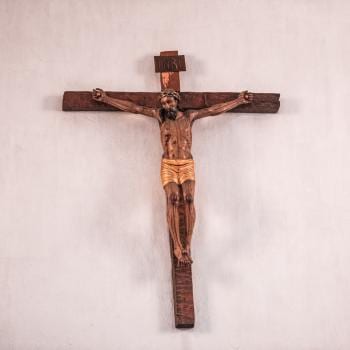Casting my eye over the lections for this morning, I remembered that I gave a Lenten talk about Joseph a while ago, right after reading The Life Changing Magic of Tidying Up. I cut out the first half of the talk where I complain about trying to throw away all my own stuff. Here is the part that matters—What happened to Joseph when his brother’s Kon Mari’d him. And more importantly, can you let Jesus tidy up your own soul?
******************************************************************
Digging around in the Bible, you’ll find a lot of imperfectly curated stuff, a lot of material objects that seem oddly placed, but are actually critical for moving the story forward.
In Genesis 37 we learn that Jacob loves Joseph more than all his other sons, and that while Joseph is still a youngish person, Jacob gives him a beautiful coat that all his brothers come to loathe and envy. They nurse this hatred and envy so that it sinks down and takes root. Joseph’s happy go lucky life as one beloved doesn’t let him really see the danger lurking in the eyes of his brothers. And Jacob doesn’t want to see it. It’s just the way things are, the way he was loved by his mother and Esau was loved by his father.
Jacob has settled his family into the land of the promise and there God blesses him abundantly. His flocks and herds grow exponentially and he, like his father and grandfather, becomes fantastically rich. Just sit in the cool of the evening for a minute and hear the clamorous bleating of the flocks as all those shepherds try to get every single animal a drink, as the dust and smoke rise up from all the dusky cooking fires, as children are told to get a move on and bring that bowl here right now. The noise, and then the quiet. It’s easy to hide in the clutter, to sit around the evening meal and not make eye contact, to let the eye trace out the contours of the tent, the rugs covering the ground, the smooth lines of the bowl of steaming, nourishing stew, to let exhaustion hide the truth of your own bitterness and anger.
So the sons of Jacob take the flock off for better pasture and Joseph stays home. But then Jacob sends Joseph to take them a message. And you know what happens. They see him “coming from a long way off.” But instead of running to meet him with joy, as one father was said to do so much later upon seeing his lost son crest the horizon, these stick fast where they are and plot. When Jospeh reaches them they strip him of his beautiful coat and throw him in a pit, and then sell him for twenty pieces of silver. The bag of money sits heavy in the hand. I wonder how they spent it? Who was the one to carry it home where they faced their father at the end of the day? Who met the pain in his eyes when they told him that Joseph was dead?
And then, observe, they don’t speak of it again.
And meanwhile, days turn into weeks turn into months turn into years, Joseph rises and falls and grieves in Egypt.
In chapter 39 we discover that he has become the perfect household manager–anticipating everybody’s needs before they even know they have them, handling the stuff and the schedule and the people so that Potiphar only has to think about what he is going to eat. Imagine his impeccably peaceful sleep, his waking comfortably to a favorite breakfast morning by morning, like being on a years’ long holiday, But then it all comes crashing down when his wife catches hold of Joseph’s garment and he lets it fall and runs away. She flings it down in wrath and falsely accuses Joseph. I wonder what she does with it afterwards? Does it lie there, flung over the back of her chair, and accuse her conscience? Does she give it away?
Joseph is thrust into prison where there are no nice garments. At one point the prison is called a house, but later, after many years of managing it and making sure all the other prisoners have what they need, Joseph refers to it as a pit. And don’t you wonder about the Lord’s favor through all those years? The favor of the Lord meant that Joseph had plenty of work. The material lives of all the other prisoners sat in his hand—what they ate and wore and how they lived. I would have said that Potiphar with a servant like Joseph is the favored one, but the text tells us that it is really Joseph. Like a woman who is blessed with lots of children and who never gets to sit down and who comes to the end of every day exhausted, lavished by the favor of the Lord.
You wouldn’t know it from the state of her house and the din of children organizing a world in Minecraft. When she passes you by in the grocery aisle you say, “Boy, you sure do have your hands full.” She glares at you and the word that crosses your mind isn’t ‘blessed,’ its ‘what’s her problem.’ But what the Lord sees as blessed is usually the opposite of what we think will make us happy.
Finally, in chapter 40, two servants of the pharaoh happen into Joseph’s life. They dream disturbing dreams and it is Joseph, the keeper of their food and comfort, who is able to peer into the darkness of mind and future. He tells them the meaning of their dreams and it happens the way he says. The cupbearer is restored to his place, and the baker is executed, and Joseph sits in prison for two more years. You only need to mutter those three words to yourself, two more years, and feel the full weight of a year, of waiting for something you feel like you can’t wait for any more, to understand how it was for him. He does his work every day, but adds the cupbearer to the list of people he has to forgive, perhaps along with God for leaving him there for another small eternity.
And then Pharaoh has a dream–rich Pharaoh, exalted, lying back in his opulent bed, tormented by visions that don’t leave him when he wakes in the morning. He bathes and applies his eye makeup recovering the weight of his enormous headdress picking over his breakfast and trying to get away from what he saw. Chapter 50 finds Joseph finally making his way, washed and shaven, to settle and relax the mind of pharaoh. There’s going to be a famine, and Joseph’s thought, planning, and hard work are going to save the world.
Granaries are built, storehouses, record keeping papyrus, devices to measure grain, chairs for grain collectors to sit on, carts to take everything where it needs to go.
And all the time, for years and years, Joseph’s brothers are sitting up there in the land of the promise, carrying on as if nothing is wrong. Their father is a shadow of himself. Day by day aging, the lines in his face deepening. He sits in the shade of his tent and he can’t move past his grief. The brothers carry on with their wives and their children and their shepherding.Does guilt follow them from pasture to pasture?Does it wake them up at night? Getting rid of their brother did not bring the joy they thought it would. Fortnightly rearrangements of the furniture never rid them of the ugliness of the thing they did.
So fast forward to the time of the famine. Joseph has collected so much grain that he ceases to measure it. He is married and has two sons. He is at the pinnacle of earthly power. When he drives through the street in his chariot everyone has to bow before him. He has a beautiful house and servants. He has a beautiful cup–his favorite cup. He has a routine. Everything runs smoothly and in order. He is the perfect manager, after all, and so the whole land of Egypt is clean and swept and ready for disaster. The booths for grain distribution, the accounting books in neat stacks.
And then, one day, as he stands overseeing the gathering of all peoples and languages to himself for food, there his brothers ramble in, the dust from the journey caked over their feet nestled into the folds of their robes. Joseph sees them over the heads of the crowd and his heart drops into his stomach. Had he anticipated this? Surely he would know that the famine would reach so far. Surely he had played this very meeting over in his mind a thousand times. Surely his own dreams had woven themselves through the fabric of his faith,
the hope of God’s sovereign provision not just to feed the world, but to heal and bless his own soul?
He toys with them for several chapters. Accusing them, sending them away, calling them back, insisting that they bring Benjamin with them. Imagine, in this age of popping out to buy what you want and need the moment your heart desires it, imagine the years and months of waiting. So of course Joseph troubles his brothers before sending them back to their father.
That long ago planted seed of death and bitterness he casts into the sun, a beam of light piercing even to the hearts of his hard hearted brothers and they go back to their father anxious, guilty, sorrowful.
And their poor father. His grandfather had once taken his own father up a mountain, facing down death and darkness, ready to obey. Jacob here has to send his youngest son into Egypt, walking the way that another would go so many generations later, fleeing not famine but the sword. Jacob wrestles once again, this time with himself, and sends away his son into a far country. Benjamin goes with his brothers to see the face of Joseph.
And there is the cup. Joseph uses it to draw them back to himself, to finally reveal who he is and what a work that God has done–not just to feed them, to clothe them with new clothes, but–and this is the magic part, the life changing part, the joy producing part, the thing that you can never achieve by your own efforts and work, the thing that must come to you from the outside, not magically by miraculously, by the intervention of God himself because you do not have the power or managerial capacity or even the desire to do it yourself–to take the bitter root of sin and haul it into the light.
The brothers admit to each other what they have done–we sinned against our brother they say–they are sorry, they weep, they mourn, and they are forgiven–what you meant for evil, God meant for good, says Jospeh.
This is the ultimate life change–for God to intervene, to so organize the events and circumstances and stuff of your life to maneuver you into an impossibly painful situation where you are faced with your own helplessness, with the black, bitter things that you have done, with the spiritual rooms full of detritus, ugliness, death, garbage, trouble, with things so shame making that you can’t look your own self in the face. God brings you to look at them, makes you see them, and then, while you weep and mourn, casts your humiliated gaze up to the one on the throne, the one who holds all the bread in himself, whose cup is filled with salvation. God takes that thing, whatever it is, to himself and puts it as far away from you as the east is from the west.
You don’t even have to hold it in your hands and consider what it is and how much you want to hang onto it. He just takes it away, never to persecute another, but to die forever by the death of his own self.
And in its place? Not more sin, not more stuff that you will have to deal with in another decade. In its place is himself. The life altering joy of having a God who favors you, who blesses you, who brings you as close as the food itself is close to the body it goes into, as the wine that spills out of the cup and into the mouth.
You don’t go out of the room where you have faced your brother, where you have looked upon the one whom you have pierced and wept and wept and been sorry and asked forgiveness and finally and fully been forgiven and restored, to do it all again. You go as one with your mind changed.
You go to unpack your furniture into your new home, your new life with God. You arrange your knickknacks and hang up your pictures. You shove your books on your shelf and stick your box of cassette tapes into the attic. You arrange all your clothes in the closet by color and fold your tops so that they stand up evenly in the drawer. Or maybe, better than that, you shove everything in and walk away free, clear, unburdened, able to look so many people in the face. Your heart, once crippled and lonely, embittered and dark, thrown into a pit of your own making, is now filled with the life of another person, a person whose power to arrange the cosmos overtakes yours, whose food and drink is so rich and satisfying that you have enough to give to others.












